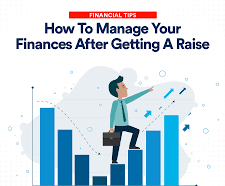
Receiving a rise can be exhilarating, but it can also be difficult if you don’t know what to do with the extra money. When you receive a raise, there are three important things you can do to help put your financial health first. Of course, your mind may immediately turn to all the things you would like to buy with this extra cash.
The following nine possibilities are worth considering with your hard-earned money when you receive a rise at work:
Invest
It should come as no surprise that one approach to give your financial health top priority is to invest whatever excess money you receive. The majority of us actually need to invest more because we would experience lifestyle creep if we spent every extra dollar we earned. We would eventually wake up wondering why we could never afford our opulent retirement lifestyle, and the answer would be that we had never stopped spending more than we could afford to whenever we were able to increase our income.
SAVE
Savings and investment are two different things when it comes to additional money, yet they are both significant. In case you need to access your money for emergencies or big expenditures you may be making in the future, you should aim to have a respectable amount saved that is not part of your assets. You can create a bigger and, one could say, much-needed buffer between your present living expenditures and your future retirement savings if you can boost the amount you contribute each month to these accounts and increase their balances. It is helpful to maintain a respectable quantity of savings so that you can keep your investment accounts untouched until you really need them.
SPEND
You should be rewarded for your hard work when you put in a lot of effort. Life might get quite boring if all you did was work and save money. Assuming your financial situation is sound, feel free to spend portion of your newfound income anyway you like. Enjoy a portion of your newly acquired sum however you please. Not only does spending some of your money according to your wishes support your emotional well-being in the short term, but it also makes it simpler for you to save and invest the remaining two thirds of the extra money, which will help you reach your long-term financial objectives.
ESTIMATE YOUR NEW HOME PAY.
“After getting a raise at work, don’t immediately start spending your new money,” says Michael Okoronkwo, founder of a Elexdon Group . “Instead, take a moment to assess your current financial situation and plan for future financial security.”
When you get a raise, start by figuring out how your boost in salary will affect your paychecks. Just because you’re going to be earning an extra money per year, for example, doesn’t mean that will be your additional take-home pay. You’ll need to factor in your tax withholding and any other deductions from your paycheck (think food, health insurance, commuter benefits, office gym membership etc). To determine your net pay increase when you get a raise, subtract your old paycheck from your new paycheck. This is the amount that should inform adjustments to your monthly budget.
WIPE OUT ANY EXISTING DEBT
If you are working to eliminate debt, then when you get a raise it could be a great time to accelerate your efforts. Credit card debt, student loans, or even a car loan—the easiest way to build a positive net worth quickly is to eliminate any debt standing in your way. While reducing your debt load may not give you instant gratification like a treat-yourself splurge, just knowing you are debt-free (or moving in that direction) can be a major victory.
“You want to get rid of high-interest debt as soon as possible,” says Jackie Lam, founder of a financial blog for freelancers. “That interest will devour your hard-earned money,” she adds.
BUILD YOUR EMERGENCY FUND
“Paying off high-interest debts and creating an emergency fund are two great places to incorporate this increased income,” Banks says.
It’s never fun to think about an emergency that may require you to dip into your savings, but building, or beefing up, your emergency fund is one way to put your increased salary to work. When deciding what to do with a raise, think of an emergency fund as peace of mind if an unexpected cost does creep up. It’ll be there for you to fall back on if your water heater breaks, you need to have work done on your car or someone in your family loses a job. Most experts agree that your emergency fund should cover three to six months of living expenses. Place your fund in a savings account so you can have easy access in the event of an emergency.
CONTRIBUTE TO YOUR RETIREMENT
When you get a raise, you can think about your golden years regardless of your age. “Using your windfall to increase monthly retirement contributions, even if just by 1 percent, can have a dramatic impact on the stability of your future financial standing,” Banks says.
One of the easiest ways to make sure your retirement account is getting the attention it deserves is to make it automatic. Determine how much of your raise you want to place into your IRA (Individual Retirement Account) or 401(k) every year, and then automatically have the maximum amount possible transferred each month. If your employer will match your contribution, take advantage of that opportunity to grow your savings at an increased rate.
DO SOMETHING FOR YOURSELF
You worked hard to earn your raise, so enjoy it a little. Set aside a portion of your increased income and treat yourself. Maybe you’ve had your eye on a new pair of shoes, or you’ve been waiting to pull the trigger on some new furniture for your home. You could even place a portion of your raise into a separate savings account to be used for vacations.
ENJOY YOUR SUCCESS
Getting a raise at work is cause for celebration—and identifying new financial opportunities. Deciding what to do with a raise when extra income comes in can lead to long-term benefits and help ensure your







